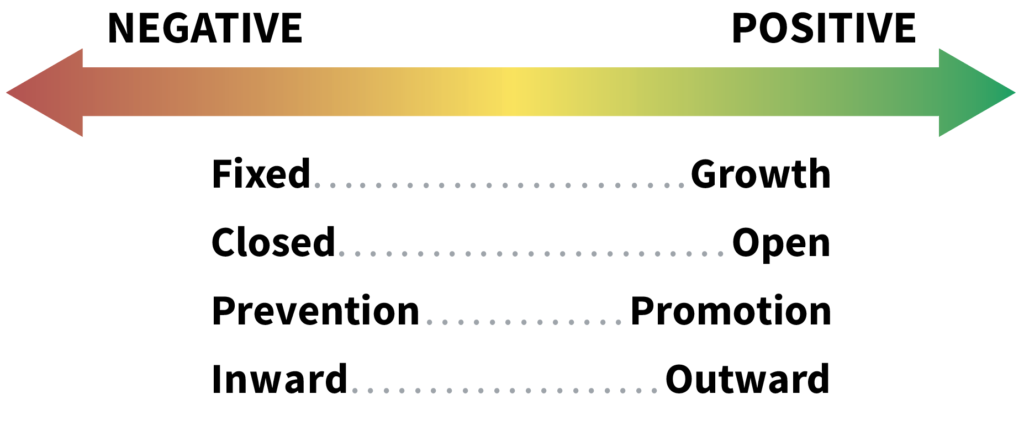What are Mindsets?
Many people consider mindsets to be similar to one’s attitude toward something, but our mindsets are so much more than that. In fact, they are the most foundational neural mechanisms that explain why we do what we do. But, let’s not get too far ahead of ourselves too soon.
Many people consider mindsets to be similar to one’s attitude toward something, but our mindsets are so much more than that. In fact, they are the most foundational neural mechanisms that explain why we do what we do. But, let’s not get too far ahead of ourselves too soon.
I am going to define mindsets in two different ways.
First, I am going to explain how our mindsets are our mental lenses.
Second, I am going to demonstrate how our mindsets are long-range neural connections that play a foundational role in how our brain operates.

Mindsets as Mental Lenses
I think the easiest way to describe mindsets is as mental lenses. In fact, the best definition of mindsets that I have come across defines mindsets as:
Mental lenses that selectively organize and encode information, thereby orienting an individual toward a unique way of understanding an experience and guiding one toward corresponding actions and responses.
Our mindsets dictate how we see and interpret our world. As such, our mindsets are foundational to how we think, how we behave, and how successful we are.

For example, how do you see and interpret failure?
If we see and interpret failure as being something that indicates we are a failure (i.e., bad), we are likely to avoid situations that are ripe for failure (i.e., challenges) and give up when the going gets tough.
Such responses feel “right” to someone who sees failure as being bad. While these responses may feel “right,” they are also limiting.
If we see failure as opportunities to learn and grow (i.e., good), we are going to be more likely to approach challenges and persist when the going gets tough.
Mindsets as Long-Range Neural Connections
Not quite sold on how foundational our mindsets are to why we do what we do? Buckle up!
Neurologists have found that our mindsets are a specific type of neural connections in our brain that are called long-range neural connections. These neural connections integrate the brain’s three major brain regions (i.e., reptilian, mammalian, and human brains) and controls how mental stimuli are processed through the three major brain regions.
In fact, these long-range neural connections have three foundational roles:
- Our body sends our brain way more information than it can process, so the first role of these long-range neural connections is to filter in the most important information.
- For example: We will likely filter in information about whether we fail or not, but we may not filter in a constant whirl of an air conditioner. This primary filtering largely occurs in our reptilian brain.
- For example: We will likely filter in information about whether we fail or not, but we may not filter in a constant whirl of an air conditioner. This primary filtering largely occurs in our reptilian brain.
- One information gets filtered in, it needs to be interpreted. Thus, interpreting the information filtered in is the second role of our long-range neural connections.
- For example: does our failure say something about who we are or is it an opportunity to learn and grow? This interpretation largely occurs in our mammalian brain.
- Once we have filtered and interpreted the information, our long-range neural connections activate different elements about ourselves so that we can effectively respond to the stimuli filtered in and how it is interpreted.
- For example: if we interpret failure as a bad thing, our long-range neural connections will likely turn on defense mechanisms; but if we interpret failure as a good thing, our long-range neural connections will likely turn on learning mechanisms.
Whether we have more positive or more negative mindsets is partially determined by how well integrated our long-range neural connections are. When we have more negative mindsets, these long-range neural connections are not well integrated. This means that our three major brain regions do not works effectively as a team. Instead, our reptilian and mammalian brains overpower the logical processing of the human brain. But, when we have more positive mindsets, these long-range neural connections are better integrated, allowing our human brain to do a better job of regulating our reptilian and mammalian brains.
Although this is a bit complex, can you see how these long-range neural connections are, more simply, our mental lenses?

The Power of Understanding What Mindsets Are
It has been said that “knowledge is power.” In this case of mindsets, this is true in several regards.
First, for most people, our mindsets operate below the level of our consciousness. But, when we understand what mindsets are and how they work, it is easier to become conscious of them. And, the more conscious we are of them, the more empowered we are to improve them.
Second, if we ever want to change or improve who we are, we are going to be the most successful at changing or improving ourselves if we focus on the most foundational aspect about ourselves: our mindsets. Too often, people try to change or improve by focusing on learning new things or developing new behaviors. Such approaches are often limited because their prevailing mindsets will likely resist their developmental efforts.
Third, when we understand that our mindsets are long-range neural connections, it becomes clear what we need to do to improve our mindsets. We need to rewire (i.e., integrate) our mind. The truth is that we all have negative mindset neural connections and we all have positive mindset neural connections. Whichever mindset neural connections are stronger are the ones we primarily filter information through. This is because they fire more readily and more rapidly. Thus, if we want to shift our mindsets, this means that we need to activate and strengthen our positive mindset neural connections. They are like muscles, the more we use them, the stronger they become, and the more naturally we use them.


Different Types of Mindsets
Scientists from a variety of different fields (e.g., education, psychology, management, marketing) have been studying mindsets for 30+ years. Through this effort, as well as efforts from practitioners, we are aware of many sets of mindsets.
Generally, what these experts have identified is that mindsets exist in sets representing a continuum ranging from a negative mindset on one end and a positive mindset on another.
Of the different mindsets sets “out there,” there are four that have received the most research and practitioner attention to the degree that we can be absolutely confident that these mindsets do influence how people think, learn, and behave; and thus, how successful one is in their life, work, and leadership.
The four mindset sets are paired as follows:



